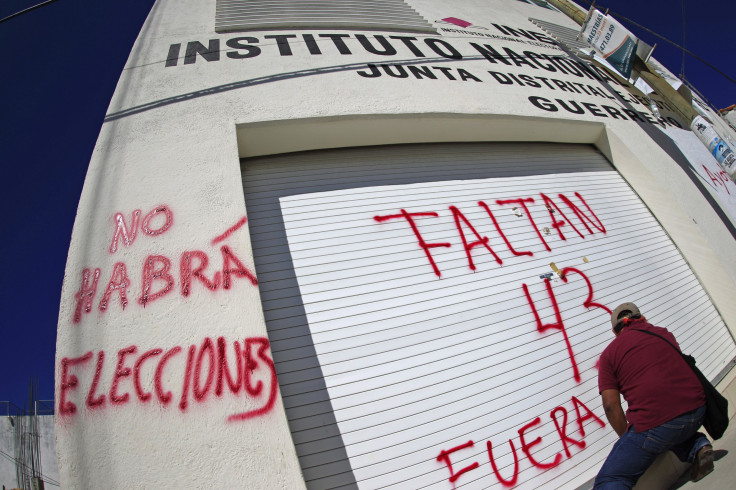
Two Mexican politicians were murdered and one was kidnapped in a matter of days only weeks ahead of June 7 elections. The three politicians allied themselves with different parties and ran for local positions in the states of Guerrero and Michoacán. As we reported earlier this morning, Enrique Hernández Salcedo, far-left Morena candidate for mayor of Yurécuaro, Michoacán, was killed last night in a drive-by shooting. The assassination occurred during the middle of a campaign stop in a public square, and three others were injured during a campaign stop. Héctor López Cruz, PRI mayoral candidate of Huimanguillo, Guerrero, was executed in the doorway of his home at around 9pm on Thursday. His brother was injured in the attack.
Silvia Romero and two aids were reportedly kidnapped overnight on Tuesday, but found in good health by federal police on Thursday. Officials have been short on details, but the candidate was clearly shaken up and has suspended her campaign for a few days. Romero, of Iguala, Guerrero, is running for a federal deputy seat in congress. She was Guerrero’s education minister until her boss, Gov. Angel Aguirre stepped down in the wake of the disappearance of 43 Ayotzinapa students.
The three attacks this week follow murders of mayoral candidates in March and April. Aide Nava was running in the PRD primary race when gang members, allegedly of the Los Rojos cartel, killed her. Before her death, Nava’s son had disappeared and her husband was murdered. Nava’s killers left her decapitated body in the street with a white sheet stretched over her body, spraypainted with a message: “This is what will happen to all of the fucking politicians that don’t get in line.”
El cuerpo de la aspirante del PRD a Edil de Ahuacuotzingo #Guerrero, Aidé Nava, fue hallado decapitado. pic.twitter.com/9xsNznHkxv
- CCSPJP (@CCSPJP) March 12, 2015Who will win? Who will run???
President Peña Nieto has said that the June 7th mid-term election will be referendum on his first term as Mexicans vote in 500 congressional district and across 300 mayoral races. Yet how will civil society have their voice translated into politics if their candidates are under threat? National newspapers are calling running for office in Guerrero “a death wish.” Cartels in Mexico are extremely fractured and there’s no evidence yet that links the murders. If there is a concerted effort among leaders of organized crime it appears to be focused on local-level politicians, for now.
Ulises Fabian Quiroz also of Guerrero, was executed while running for mayor of Chilapa as a member of the PRI-Green coalition. A group of cartel commando stopped him and 15 people on the highway. They lined up the group, put a bullet in Quiroz’ head, and told the rest to leave “if they didn’t want to die.” One article written after the incident asked “Who will sign up to stand in for a candidate executed by narcos?” After the funeral, the PRI prematurely announced that they would name a replacement in the campaign by the end of the day. The top candidate said “no.” So did the next four. When the finally found a candidate, he stubbornly refused a security escort.
Enrique Hernández Salcedo, the slain Yurécuaro mayoral candidate ran on an anti-cartel campaign, specifically targeting the local Knights Templar gang and local officials under their thumb. He participated in a vigilante resistance movement that wrestled the Knights Templar out of his town, or at least discouraged the gang from continuing it’s extortion rackets there. One of his colleagues, Hipólito Mora, acknowledged after Salcedo’s death that he’s likely to be killed, but is moving forward on bid to be elected as federal deputy in Michoacán.
The relative impunity and far reach of cartels in this election cycle appears to be unique. It’s not the first time that candidates have been killed by cartels, but the number and geographic reach of these killings may be unprecedented in modern Mexican democracy. The impact on the elections remained to be seen. Seperately, cartels are trying to intimidate candidates, but together, their actions could unite Mexicans into a collective fight against the cartels. In a sense, organized crime groups are exposing a weakness. Honest politicians and those who want to dismantle the cartels really do pose a threat to criminals and that threat cuts across party lines.
Peña Nieto doesn’t look like a strong leader in this fight. He’s already embroiled in his own corruption scandal and charged with incompetence in the Ayotzinapa case. His strategy against crime was supposed to turn a new page, but ended up being a carbon copy of his predecessor. Some have gone as far as to called the government a gang in itself, saying that the state killed the 43 Ayotzinapa students. Some have called for the cancellation of elections. Yet the state still struggles against the leash held by voters. Cartels have shown a brutal but divided response to local politicians trying to undo their impunity. United at the ballot box or even in the streets, Mexican citizens still have the power to reign them in.
© 2025 Latin Times. All rights reserved. Do not reproduce without permission.




